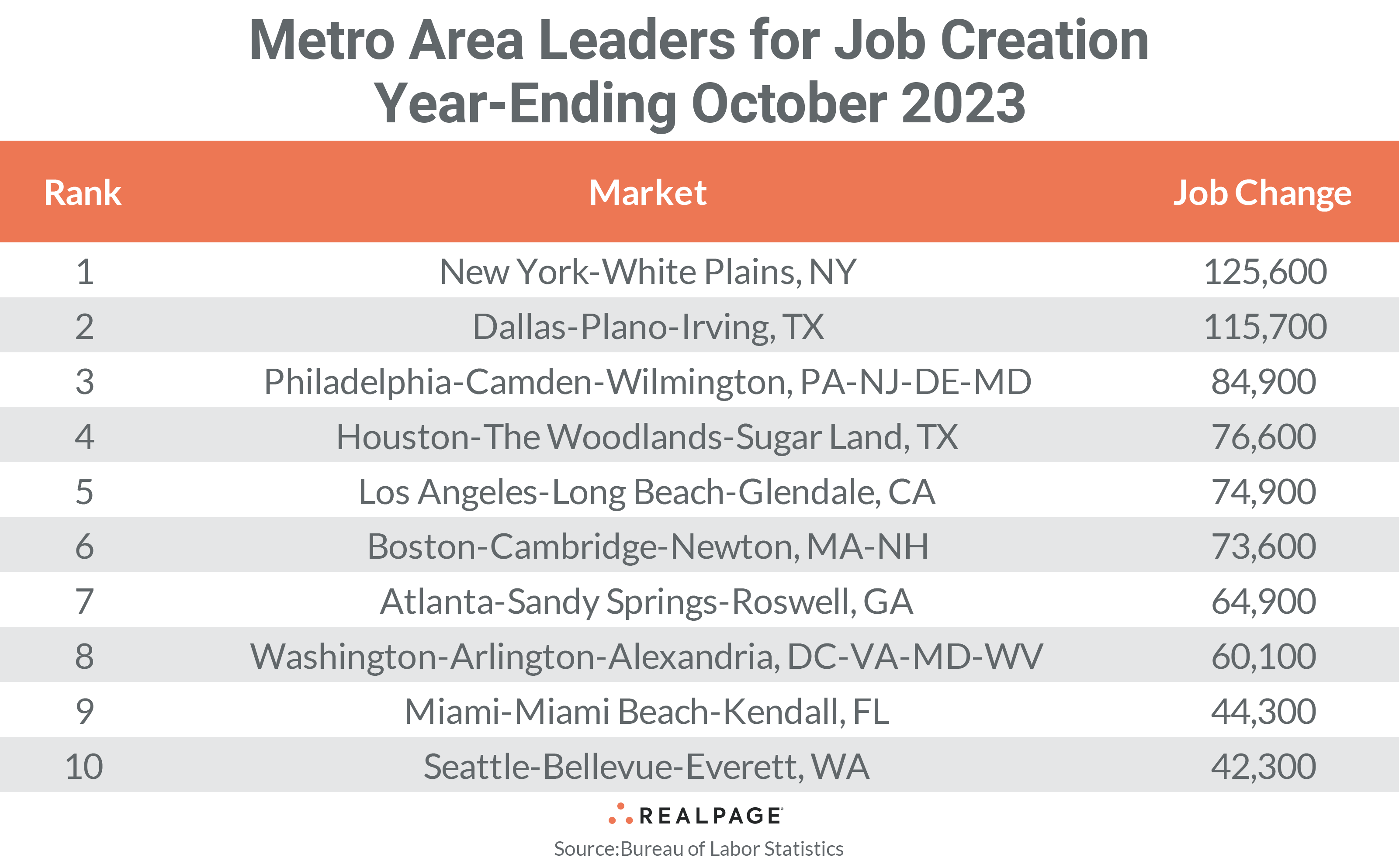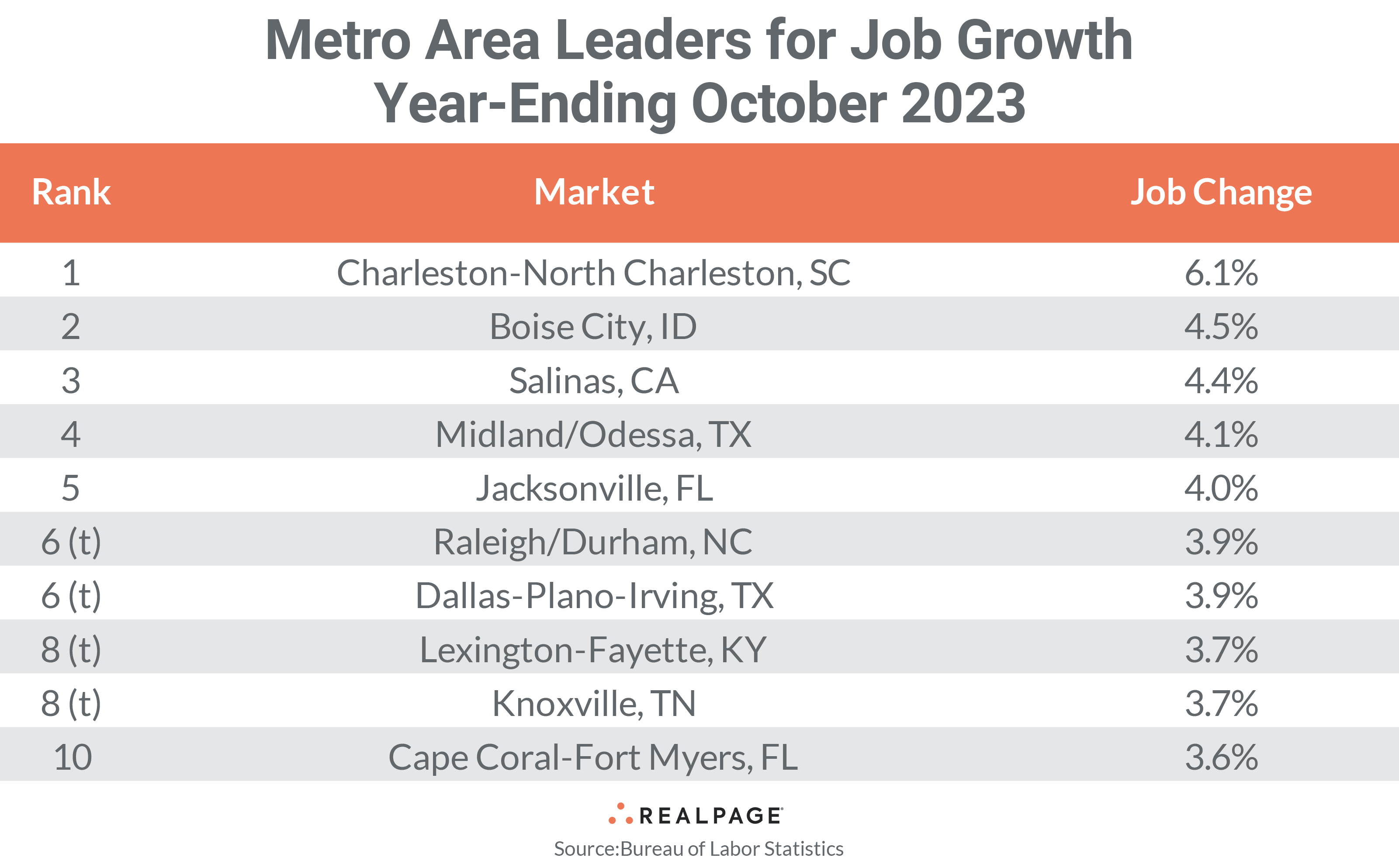Nationally, monthly jobs gained in October may have been disappointing compared to economists’ projections, but the economy is still generating a sizable number of jobs in individual metropolitan markets, although they are slowing also.
According to the latest data release from the Bureau of Labor Statistics (BLS), the top 10 of RealPage’s top 150 markets added 762,900 jobs through the year-ending October 2023, almost 26% of the total jobs gained last year for the U.S. but down 11% from last month’s annual total for the same 10 markets. Last month’s top 10 accounted for 29% of the U.S. total.
Nine of last month’s top 10 markets returned to this month’s list with just the first two remaining in place and several other markets changing rankings.
As it typically does, New York continues to lead the nation in annual gains with 125,600 new jobs for the year-ending October, down about 32,400 jobs from last month and 180,700 fewer jobs gained than one year ago. Dallas remained in the #2 spot with an annual gain of 115,700 jobs, about 14,200 jobs fewer than last month and 50,800 less than last October’s annual total.
Although Philadelphia’s annual job gains slowed by about 2,500 jobs from September’s total, the City of Brotherly Love moved up two spots from last month to #3, gaining 84,900 jobs for the year. Houston remained in the #4 spot, gaining 76,600 jobs for the year, but that was down more than 20,000 jobs from last month and 84,700 from last year.
Los Angeles replaced Philadelphia at the #5 spot, gaining 74,900 jobs through October, slowing by 14,400 jobs from September and 76,600 from last year. Boston moved up a spot to #6 with 73,600 jobs gained, just 2,700 less than last month and only 1,300 fewer than a year ago.
Atlanta also moved up one spot from last month to the #7 spot, gaining 64,900 jobs for the year, slipping only 2,100 jobs from last month but down 50,200 from last year. Washington, DC fell back two spots to #8 in October with a gain of 60,100 jobs, 8,500 fewer than September’s annual total but just 8,000 less than last October.
Miami jumped onto this month’s top 10 list with 44,300 jobs gained, 2,800 more than last month but 15,700 less than last year. Seattle remained in the #10 spot, gaining 42,300 jobs for the year, but that was 3,800 fewer than last month and 17,200 less than last year.
Altogether, the total number of jobs gained for the year-ending October for the top 10 markets was down 98,200 jobs from their collective total last month. Additionally, the next 10 markets (#11 through #20) saw their annual jobs gains decline by 57,200 jobs, in toto.
As was the case for the past three months, only New York and Dallas exceeded 100,000 jobs gained and only six gained between 50,000 and 99,999 jobs, three fewer than last month. Seven markets reported annual job losses for the year, led by Denver with a loss of 9,900 jobs.
Like annual job gains, the annual percentage change in employment saw some resilience as well. The average employment percentage gain for the top 10 markets averaged 4.2% in October, equal to last month. Additionally, seven of October’s top 10 markets had higher percentage employment gains than in September.
Six markets returned to October’s top employment change list from September with Charleston, SC returning as #1 with 6.1% employment growth, 80 basis points (bps) above last month’s rate. Boise, ID jumped to the #2 spot from #10 last month with 4.5% job growth, up 70 bps from September.
Salinas, CA moved up to the #3 spot, growing their employment base by 4.4% in October with a 30 bps increase from the previous month. The energy-dependent market Midland/Odessa, TX ranked #4 with 4.1% growth, up 10 bps for the month but down 540 bps from last year. Jacksonville, FL rounded out the top five with 4% employment growth, up 10 bps from September.
Raleigh/Durham, NC and Dallas tied for #6 with 3.9% job growth but the Research Triangle improved by 20 bps from last month while Big D dropped 60 bps. Lexington, KY and Knoxville, TN tied for #8 with 3.7% employment growth and Cape Coral-Fort Myers, FL ranked #10 with 3.6% employment growth, down 20 bps from September.
Compared to one year ago, Midland/Odessa slowed the most for job growth among the top 10, with the aforementioned 540 bps decline. Dallas fell 200 bps, while five of the remaining top 10 fell between 30 and 70 bps. Boise and Charleston improved from last year and the small Salinas market jumped 210 bps in job growth compared to one year ago. Outside of the top growth markets, the worst annual decline was in Stockton-Lodi, CA, which saw job growth fall 510 bps from last year’s job growth to 0.4%, followed by Wilmington, NC, where annual job decline of 0.2% was 480 bps behind last year’s pace.
The weakest major markets for percentage change are still in the industrial Midwest, Mid-South and Mountain West. Major markets with employment declines are Denver, Detroit, Memphis and Des Moines, while modest job growth of less than 1% were seen in Milwaukee, Columbus, OH and Chicago. Sub-1.5% growth major markets include Pittsburgh, St. Louis, Minneapolis, San Francisco, Omaha, West Palm Beach, Riverside and Oakland. Seventy markets had annual job growth rates above the not seasonally adjusted national average of 1.9%, the same as in September.









